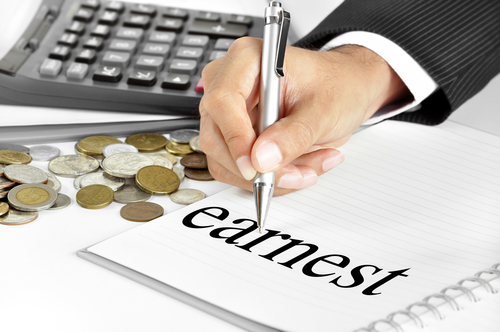Published February 18, 2025
Earnest Money: What You Need To Know

What is earnest money?
Earnest money is a deposit that you as
the buyer will make on a property when you get an offer accepted.
It shows the seller that you are
serious about wanting to buy the property, so the seller can take the home off
the market, and you can move forward with your due diligence period and home
inspection.
When your offer gets accepted, you will
submit your earnest money by check, bank check, or electronically with the
Earnest app which is like Venmo for real estate.
The check or money order will be
written to the seller’s brokerage or attorney’s office. Then, they are required
to immediately deposit the funds into an escrow account.
Technically, the agreement is not valid
until there is consideration, or the earnest money deposit is accepted by the
seller.
In Massachusetts and sometimes Rhode
Island, the earnest money can be split up into two portions, an initial deposit
when the offer is accepted, and the remaining portion, usually after the due
diligence period. This is not always the case though, as sometimes the entire
deposit will be given at once depending on the agreement between the buyer and
seller.
How much should your earnest money
deposit be?
It’s usually between 1% and 5% of the
purchase price, though it can vary from state to state.
And, depending on the state of the
market, it could be even more. Putting down a strong deposit in a very
competitive market could make your offer stand out.
What if you don’t have that much for earnest money?
If you don't have a whole lot to put
down for earnest money, put down what you can, depending on the situation.
(Your agent can help you figure that out) There are no rules on how much has to
be put down for earnest money. There are many other factors that can help your
offer stand out.
Can you get your earnest money back?
Yes, there are several potential
contingencies that will protect your earnest money.
THE INSPECTION CONTINGENCY
If the inspection reveals issues with
the property, the buyer can either
- Negotiate for the seller to have the issue repaired
- Refund a certain amount of the purchase price to
cover repairs
Or
The buyer can then walk away from the
deal and have their earnest money refunded if, the inspection reveals an issue
that the buyer simply can not, or does not want to deal with, very high-cost
items such as
- Foundation issues
- Pest invasions
- Plumbing leaks
- Roof leaks
- Mold
- Etc.
The Appraisal Contingency
If the home does not appraise for the
purchase price or above, the buyer has the option to negotiate with the seller
to sell for the appraised value, or if the buyer can (and wants to) cover all
or some of the difference, they can do that. If the buyer and seller can not
come to an agreement and the deal falls through, the earnest money will be
refunded to the buyer.
The Mortgage Contingency
Where, if, despite reasonable efforts,
the buyer is not able to secure financing. The buyer can get out of the
contract and get their earnest money back.
Make sure you're working with a good agent
Having a good agent will ensure that all
the needed contingencies are in the contract, and that you are working within
the guided timelines in the contract. A good realtor will be paying very close
attention so that you will never have to worry about losing your earnest money
deposit.
If you decide that you don’t want to
buy the property after all of the contingency dates have passed, then you may
not get your deposit back. The seller will be able to keep the funds as damages
for lost time.
Where does my earnest money go?
When you get to the closing, your
earnest money will be applied to your down payment and closing costs, or if you
have given more earnest money than you need for the closing then the excess
will be refunded to you after the closing.





